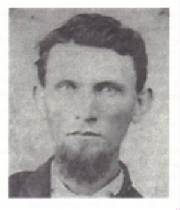Letter from 2nd Lieutenant Hugh W. Barclay
Company B, Twenty-third Georgia
25 February 1864

2nd Lieutenant Hugh Barclay
The letter below, published in the Athens Southern Banner on 9 March 1864, was from a soldier in the 23rd Georgia, who identified himself only by his initials, H.W.B. However, Bob McLendon, a Civil War reenactor and historian, identified the author as 2nd Lieutenant Hugh W. Barclay, of Company B. The second commander of the 23th Georgia was Colonel W.P. Barclay, who was killed at Antietam (17 September, 1862) where the regiment was severely mauled. Apparently, Colonel Barclay and 2nd Lieutenant Barclay were relatives.
Lieutenant Barclay was mustered into the 23rd Georgia on 31 August 1861, at Camp McDonald, Georgia. The unit served with the Army of North Virginia. Barclay was admitted to the Richmond Chimborazo Hospital #1 on 17 April 1862, and returned to duty on 5 May 1862. He was promoted to 1st lieutenant on 10 June 1862. Captured with almost 200 others of his unit at Chancellorsville on 2 May 1863, he was exchanged on 23 May and was listed "present but sick" during July and August of 1863. He was later listed as AWOL since 15 June 1864. However, a report dated 28 October 1864 shows him in the Army of Tennessee without leave since 10 May 1864. On 15 August 1864, a roster of Company E, 30th Georgia Battalion shows him present for duty. The 30th Georgia later became the 11th Georgia Cavalry. Barclay's brother-in-law, Colonel Andrew Young, was the commanding officer of the 30th/11th at the time, and Barclay served as major and then lieutenant colonel.
Barclay's service record is a wonderful example of why it is often difficult to effectively track enlisted men, officers and units that served in the Confederate Army.
Florida, Feb. 25, 1864
Camp 23rd Ga. Reg. near Baldwin
Mr. Editor:
Believing a brief account of the engagement at Ocean Pond would be interesting to your readers, I am induced to write. Colquitt's brigade to which I belong, was in camp at the time near Olustee Station, twelve miles east of Lake City. At about 8 o'clock on the morning of the 12th (sic, 20th) inst., we were informed that the Yankees were advancing. A part of the brigade was immediately ordered to some rifle pits hastily constructed near at hand; the remainder forming line of battle in the open field. In this position we patiently awaited the coming of the foe for an hour, when our General, who is a fair man, concluded to meet halfway, and two regiments the 13th (sic) and 28th Ga. were sent forward, the 23rd Ga. following soon after.
These soon opened the fight, when all the troops were brought forward. The enemy's first line in which all the known tribes were represented, negroes included, after some resistance was broken. The fight was now conducted in Indian style, both sides availing themselves of the protection of pine trees of which kind there was plenty. Our men continued to advance, never halting, making in the meantime the woods ring with the terrible rebel yell, and as a negro or a Yankee run from tree to tree muskets enough were generally leveled at them to stop their career.
After this manner we drove them about three miles when night put an end to the scene. On the following morning I rode over the field and was surprised to find so many killed, as the fighting had been most altogether a running one. At least two hundred negroes and Yankees lay dead on the field, and as to the
captured I have no reliable information, I suppose about three hundred. We captured eight pieces of
artillery, thirty four hundred stand of small arms, canteen, oil cloths, knapsacks, watches, & c., any quantity. It was a complete victory. We are now distant from Jacksonville twenty miles, and have just received marching orders. I think we will advance.
Other Letters from Olustee
Battle of Olustee home page
http://battleofolustee.org/

